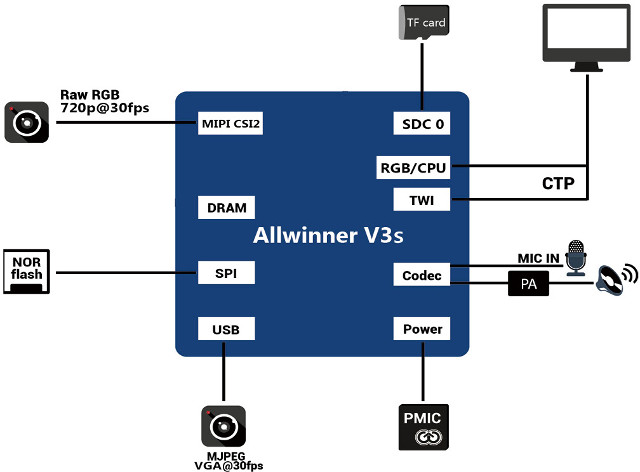Most SoCs have a very limited amount of internal SDRAM just enough to load the bootROM code, but a few integrated a few MB of RAM on-chip such as Renesas RZ/A1H with 10MB on-chip DRAM, in order to reduce costs for some applications that may not require external RAM. Allwinner V3s, designed for dual camera solutions, appeared to be such an SoC with 64MB (512Mbit) on-chip DDR2 RAM, but the block diagram seems to imply it is a System-in-Package (SiP) instead. Nevertheless you still get a single chip with an ARM Cortex A7 processor, two ISPs, a video engine, 64MB RAM, and more.

Allwinner V3s main features & specifications:
- CPU – ARM Cortex-A7 @ up to 1.2 GHz
- Memory – Integrated 64MB DDR2 DRAM
- Storage I/F – SD 2.0, eMMC 4.41, SPI NAND flash, SPI NOR flash
- Audio Codec – 92dB audio codec supporting 2x ADC channels and 2x DAC channels, 1x low-noise analog microphone bias output, 1x microphone input and 1x stereo microphone output
- Video Processing Unit
- Encoding – 1080p@40fps or 1080p@30fps + VGA@30fps H.264
- Decoding – 1080@30fps H.264 and MJPEG
- Video Input/Output
- 8/10/12-bit parallel CSI and 4-lane MIPI CSI2
- Up to 5M CMOS sensor
- RGB/i80/LVDS LCD up to 1024×768 resolution
- Peripherals
- 3x SD card controllers
- LRADC/SPI/TWI/UART/PWM
- USB 2.0 OTG
- EMAC+PHY
- ISP
- Integrated “Hawkview” ISP up to 5M pixels
- Supports 2x channel outputs for display and encoding respectively
- Supports various input and output formats
- Supports AE/AF/AWB
- Supports saturation adjustment/ noise reduction/ defect pixel correction/distortion correction
- Package – 128-pin eLQFP
The processor supports Camdroid, a lightweight operating system based on Android, as well as Linux just like its more powerful sibling (minus the built-in memory) Allwinner V3.

Beside Allwinner V3s product page, and the datasheet, there’s no that much info and talk about V3s in the Internet. Searching a bit more, I found out that Q3H-2 Sports Action Camera is based on the processor, and somebody did a short review of the thing with photo and video samples. Some people also did some hacking of the previous Q3H model based on Allwinner V3, but I’m not sure how much of that is usable on Q3H-2.
The makers of Lichee Pi One board have also designed an Allwinner V3s board named Lichee Pi Zero to sell for $6 in China, but I don’t have the full details, and only know some members of linux-sunxi have started to work on it. That still means there may be decent Linux support for the processor in a few months time.

Jean-Luc started CNX Software in 2010 as a part-time endeavor, before quitting his job as a software engineering manager, and starting to write daily news, and reviews full time later in 2011.
Support CNX Software! Donate via cryptocurrencies, become a Patron on Patreon, or purchase goods on Amazon or Aliexpress





interesting, each CSI/MIPI can do 1080P*30 while the video encoding can only do 720*60, some data lane might be shared.
@xxiao
I think the 720P is a thermal limit on the V3S and it is 1080P on the V3.
@xxiao
Xxiao, what is your favorite camera chip this week?
I know the V3S has internal memory but can it have external ram on the board like a single board computer soc?
@theguyuk
The V3 (no S) supports external DRAM. The integrated RAM versions are done to save cost and PCB space in small cameras.
http://linux-sunxi.org/LicheePi_Zero
@tkaiser
Anyone have access to Allwinner’s camdroid (mini Android) for this chip? This is great candidate for Allwinner moving over to Google Android Things (ie Brillo).
Now if only Allwinner could figure our that keeping software secret makes it really hard to use their products…..
@Jon Smirl
Best to tell that direct to Allwinner, I would suggest .
@Jon Smirl
You could google. hacking Q3H ( allwinner V3 – camdroid )
There is a thread on dashcamtalk, by user thegamut, might interest you.
@Jon Smirl
Regarding ‘Camdroid’ just read through Jean-Luc’s link above. It’s a boring Android 4.x still based on kernel 3.4.39 (close to unbelievable).
If Allwinner will ever understand how they could help others adopting their products we’ll see. Based on what I’ve heard (different business units all having their own engineering teams so that otherwise identical SoCs like A33/R16 or A83T/H8 will ‘perform’ differently based on decisions/skills by the specific BU) I doubt anything will change anytime soon.
On the other hand they became a ‘SBC SoC vendor’ by accident in the meantime (at least I don’t know of a single commercial device using H5 or R40 SoC other than some Chinese fruit Pi) but still fail to understand how to interact with community. Throwing large and ugly tarballs at you seems the best you can get.
More Lichee pi Zero info
Lichee Pi Zero is based on Allwinner V3s (ARM Cortex-A7 CPU, 1.2GHz, 512Mbit DDR2 integrated), with SPI Nor/NAND flash (16/128 MB) and TF Card slot on board.
It contains:
Breadboard-compatiable 2.54mm(100mil) DIP (2*15) package
A TF Card solt, support TF Card or TF Card size wifi module (ESP8089)
A multipurpose FPC40P connector (RGB/LVDS LCD, VGA, HDMI, DVP, GPIO etc)
MIC, Speaker, Ethernet, MIPI Camera Interface in 1.27mm (50mil) DIP connector
An multipurpose Micro USB connector (power-supply, USB serial, USB ethernet, ADB or HOST)
An RGB LED, LRADC, UARTs, I2Cs, PWMs, RTC etc
bbs.ilichee.cc/t/let-s-design-lichee-pi-zero-and-it-s-dock/27/2